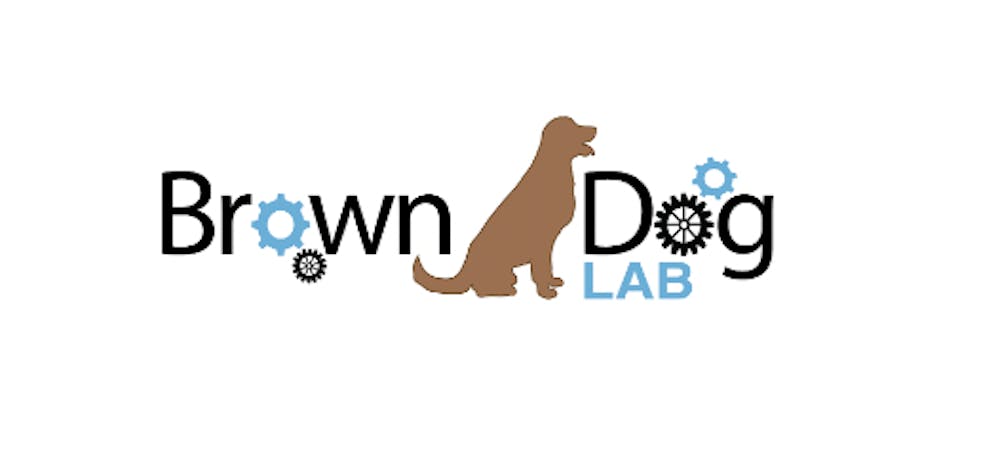The Brown Dog Lab has studied dog cognition and behavior since its founding in 2020. By recruiting canine research participants around Providence, the lab seeks to understand how dogs respond to their environment and human actions, according to Principal Investigator Daphna Buchsbaum ’02, assistant professor of cognitive, linguistic and psychological sciences.
Over the past 10 to 15 years, there has been increased interest in studying dogs for both theoretical and practical reasons, Buchsbaum said. Unlike apes, who are evolutionarily related and cognitively similar to humans, dogs are more evolutionarily distant from us, which allows scientists to study how different evolutionary processes shape their behavior.
For example, “dogs have been selected to have certain kinds of communicative and social skills that make them particularly good at relating to humans and successfully living among humans,” Buchsbaum said. In research, dogs are also easier to work with because they live with humans and do not need to be housed in a lab, she added.
“As humans, I think it's very natural for us to ask questions about our own intelligence and about human-like intelligence, but animals are interesting in their own right,” Buchsbaum said. “They can be intelligent in ways that are very different from us and … solve problems that are relevant to us in ways that we can't necessarily accomplish.”
Buchsbaum said she first developed an interest in studying canine cognition during her doctoral studies when she started search and rescue training with her own dog. “I got to see the kinds of cooperation and partnership that you develop when working with dogs,” she said.
Buschbaum said that she began to wonder, “What does this look like from the dog's perspective? What is the dog understanding about these kinds of interactions we're having? How are they learning and representing these tasks that we're doing together?”
She then began studying canine behavior during her time at the University of Toronto. In 2020, she took up a faculty position at the University and started the Brown Dog Lab as well as the Computational Cognitive Development Lab, which investigates the ways children learn. Both labs “fall under a bigger umbrella of understanding where intelligent behavior comes from,” she said.
Buchsbaum defines intelligence as the ability of organisms to use abstract thinking, create cognitive representations and “flexibly solve problems that are new to them or in a variety of domains.”
The Dog Lab is currently working on three projects, according to Buchsbaum.
The first project investigates “how dogs understand pointing,” said Miriam Ross GS, a cognitive science PhD candidate in the lab. Interestingly, “dogs are generally pretty good at this, and they can learn this as puppies with not a lot of experience. But apes and primates, our closest living relatives, don't understand pointing.”
By evaluating dogs’ responses to pointing, this particular project seeks to learn the “differences between dogs in different cultures in different countries,” Ross said.
Another project uses Zoom as a medium, working with dog owners to investigate dogs’ food preferences. “Basically, we manipulate the order of presentation and the location of different food items and see if dogs go to the food they prefer more or just the closest food,” Lauren Bonner ’24, an undergraduate research assistant at the Dog Lab, said.
One of the lab members will “run a Zoom session with the dog and (the) owner, coaching the owner through how to demonstrate the experiment,” Buchsbaum said. “It’s been going very well.” This method allows dogs who are highly anxious or live far away to participate.
The third project utilizes eye-tracking goggles to look at how dogs “evaluate their visual environment,” Buchsbaum said. After being trained at home by their owners with a training pair of “little doggy goggles,” dogs come into the lab, where they “have a pair that has eye tracking equipment on it.” These goggles have one camera pointed in at the dog’s eye and another pointed out at the broader world, allowing researchers to track dog attention, she said.
The Brown Dog Lab is the first lab to use this 3D tracking in the real world, Buchsbaum said.
To participate in Dog Lab studies, dogs must be up to date on their rabies vaccinations and cannot have a bite history or aggression history with humans, Buchsbaum said. Other than that, “we’re pretty much open to any dog.”
Participants “get an appointment and (they) come in with (their) dog for about half an hour to an hour and (they) essentially just play a game with them,” Ross said. “It’s a study, but the priority is the dogs have fun. They get a lot of food or they get to play with toys.”
“We don't pay people for coming in, but we give them a little certificate of their dog and it goes from being a freshman all the way to getting a PhD,” she said.
In the future, the lab hopes to study canine social interaction by combining eye tracking work with previous work it has done on social reasoning. This will help researchers understand how dogs attend to their human partners, Buchsbaum said.
“This (research) has applications to our understanding of dog cognition and how they interact with humans” in a pet environment, she added, but it also has “applications to working dogs and guide dogs.”





